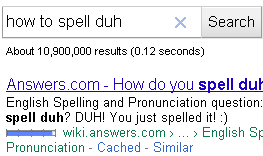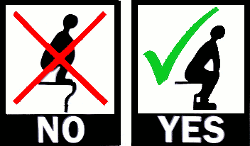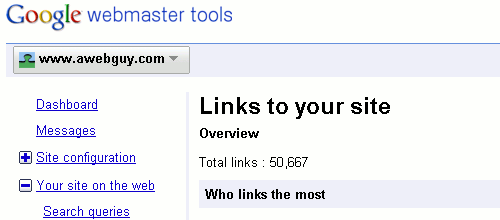
You may wonder how I will make this turn out to be both useful and humorous, but have a little faith, my Google searching friend. This is a list of my answers to some the dumbest Google searches I recently found in my server logs. Before I cut straight to my list of absurdities, allow me just a moment to set the stage.
I love SEO. There, I said it! I really do love my work, although it is usually much more fun to do it than to explain it to people. I am the first to suspect that, as I have often said, “When I Go to Hell, They Will Have Me Selling SEO“. Yes, fun to do it, but tortuous to explain it.
One of the reasons I love SEO so much is the great humor and insights to the human mind that it offers. This is also one of the reasons you may sometimes find me to be condescending and uppity, because there are truly some dumb people out there. Yes, saying that makes me a jerk, but actually more of a “PECKER” (Reference: “New SEO Acronym to Replace SEO by 2012“).
It takes all types to make a species, but wow … just “Wow!” I am a fan of people, but sometimes I have to feel just a little tinge of embarrassment for the floaters in our genetic pool.
The term “SEO”, for the uninitiated, is an acronym for “search engine optimization”, and as a practitioner in the field, it means that I can generally rank at the top of the list for damn near anything I choose. That is why companies pay me to provide this service for them. Yeah, can you believe it? Being ranked at the top of search results is actually worth paying for. That is totally crazy, I know!
Don’t hate me for it, because it comes with a touch of insanity, and a good dose of time. Like well over a decade of practice and studying SEO to know what works.
A good amount of this particular achievement comes down to having a squillion website links pointing to my blog from other websites, and having just a touch of Murnahan wit and charm. OK, you can call it “BS”, or whatever you like, but let’s face it, some websites will rank well in search engines, and some will never be indexed for popular searches. This one ranks particularly well, which comes with a great potential for humor.
I previously wrote about the downside of being obsessed with statistics and over-monitoring of user data, but it is also very important to know how people are finding a website. It tells us what we need to know, and how to make things even better. When you dig really deep, it can sometimes make hot coffee shoot uncontrollably from your nose as you laugh. This is especially the case when you try to picture what in the world those people were actually hoping to find in their online search.
With the good comes the bad, and sometimes it all goes wonky. If you rank well for the useful search terms, always it comes with unexpected absurdities. Although some of these may not seem so humorous on the surface, if you squint and look closely, there is something just a bit funny going on here.
Each of these searches have come in many variations of the search, and each is an actual verbatim quote taken from the top 5,000 searches in my website analytics within the past 30 days (typographical errors and all).
-
Dumb Google Search One: “icecream for sore bum“
OK, I hate to drop this little peach so early, but this one does set a certain tone. This is an actual search that has been repeated in many various forms, including some that were probably typed urgently like “what;s good for hemorrhoids” (Twitter, of course!). It leads users to an article that asks “Is Twitter Good for SEO?“. The article may actually be useful, but I didn’t write this one for bums. If your butt hurts, I really don’t have a lot for you, but dozens of people seem to think that ice cream may help.
-
Dumb Google Search Two: “can your testicals reconnect them selves“
I can forgive this fella for misspelling testicles, and for not realizing that “themselves” is actually just one word. This came from a Korean speaking individual in Burke, Virginia, USA. What I picture is a really frustrated little Korean guy sitting cross-legged at his computer screaming at his lover and murmuring “You betteh be right woman, oh I keow you!”
I actually took a screen capture of this one when it happened. My guess is that he did not want to call 9-1-1, just in case he actually ended up killing somebody. I hope that poor guy is alright! I also hope he does not come for my testicles for wasting his precious moment with my article titled “SEO, Social Media, and Marketing Balls“. In my defense, I did not use the word “testicles” in the article, even once, and there was no medical advice.
-
Dumb Google Search Three: “best hookers“
I suppose I kind of asked for this one when I titled an article “Hookers Write the Best Blogs“. What I didn’t realize at the time was just how many people would be performing Google image searches for pictures of hookers. I searched it one time, just to see what they were seeing. A few transsexual hookers and other creepy images later, I washed my eyes out with Listerine and vowed to never do that again!
-
Dumb Google Search Four: “buy termites online“
Who knew that termites were so in-demand? I see a lot of variations for the query of where to buy termites. Although I am sure a number of these are people seeking to study termites in their laboratory, it makes me wonder how many angry ex-husbands are dumping these voracious little monsters around the foundations of their former homes. For those looking for termites, I offer this article titled “Things You Cannot Sell Online“. Termites are not one of those things, and it is highly unlikely that what you sell is on the list, too!
-
Dumb Google Search Five: “blog trolls“
I wonder what they want with a blog troll. Yeah, I am sure that some people are just looking for a picture of a blog troll, but nobody I know has actually ever seen one. They sneak around in the shadows of the Internet. Here is what I had to say about them: A Few Words About Blog Trolls and Lurkers.
-
Dumb Google Search Six: “cheap sutures“
This one is really dumb for a couple reasons. Sutures are those things they use to stitch people up after surgery. They generally come at an extremely high cost to we consumers. I guess maybe there is not enough markup in the medical field, so they have to find their sutures cheap so they can earn an extra four dollars on a $40,000 surgery.
The other reason this one cracks me up is that I was once contracted to place a client at the top of searches for cheap sutures. They still owe me many tens of thousands of dollars, but then, that is why I now hold five of the top ten search results for their company name, “Suture Express“, along with their coveted “cheap sutures” and the names of each of their executives. Oops! 😉
-
Dumb Google Search Seven: “what happens if i set up a facebook page and dont use it?“
This one should be simple. What else could a person logically expect would happen? Your computer will be infected with a virus that causes it to explode into a squillion pieces. I would not suggest this, especially with a laptop, but if it happens to you, just Google me when you need those testicles reconnected.
In case you need to know more about Facebook or their computer-exploding virus, here is more information on the topic.
-
Dumb Google Search Eight: “SEO meta tags“
This one is actually a very popular search, and it blows my mind. I mean, seriously, just look at the source code on any one of my blog’s pages if you need a mental re-adjustment on the topic of SEO tips. I would like to give you a quote from the article these search patrons find:
“As long as there are people who ask “do meta tags help with SEO” there will be plenty of people to con them out of their money.”I hope you are not searching for information about meta tags. If so, you really should stick around and read some more.
-
Dumb Google Search Nine: “what to do when your too good at your job“
My answer would perhaps be to quit the job and seek something better. Please just don’t make it a writing career until you at least learn the difference between your and you’re. Sure, maybe this is no big deal, but if “your too good at your job”, you’re probably going to need a better resume writer.
This search landed the user on an article titled “Are You Too Good at Your Job?“, but what I think they really needed was to learn about Cousin Prolly in the article titled “Grammatical Reasons They’re Taking Their Business Over There”
Another idea for being too good at your job is to give it all up and become an SEO and social media expert. That seems to be mighty damn popular (in searches, too)!
-
Dumb Google Search Ten: “things people find“
My first thought here is “huh?” I am not so sure why, but a lot of searches just don’t make any sense to me at all. Apparently a limited few people are trying to find things people find. What they actually find is an article titled “Crazy Things People Search For” which addresses the ways people use search engines. It kind of goes well with this piece, so you may enjoy it.
-
Dumb Google Search Eleven: “how much does seo cost“
This one actually comes with a whole lot of related searches that are equally as ridiculous. Some of those are social media rates, seo hourly rate, how much does it cost for SEO, social media marketing cost, how much will a social media strategy cost, and literally thousands more.
What these searchers are obviously completely terrified and confused about is that there is a vast difference from one SEO to another. Asking the cost without knowing what to expect or understanding that it is not about cost, but rather increased profit, is about as wasteful and dumb as any question ever asked.
Have you seen the Grand Canyon? I would like to submit that the difference in good SEO and bad SEO makes that thing look like a crack in a sidewalk.
My Dumb Summary of Dumb Google Searches
I guess eleven is enough for now. I gave you a whole lot of truly useful links dispersed throughout this article. In fact, probably enough that if you sit there and read them all at once, it will make your bum hurt. So, please bookmark this page, get yourself some ice cream to sit in, come back, and take some time checking them out.
Also, please add your comments and tell me how you arrived here. If you are that poor Korean fella represented in this image, I’d love to know how things turned out.
If you are not that Korean guy, be sure you subscribe, because I’ve got a whole lot more where this came from!
Podcast: Play in new window | Download














